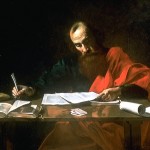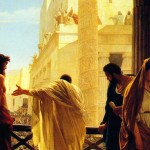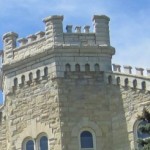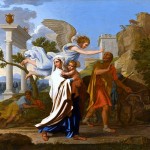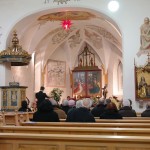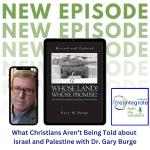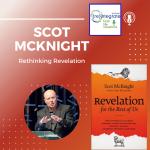When it comes to an ideological battle between nationalism and cosmopolitanism, the New Testament is entirely on the side of cosmopolitanism. Nationalists are the villains!
Nowhere is the story more powerfully told than in the martyrdom of Stephen. Yet, if you learned to read Acts 6 and 7 the way I did, you probably think about this pivotal, bloody, highly political event in our faith history with a distracted yawn. Stephen is appointed, does some stuff, goes to court, gives a long boring history lecture, dies. What of it?
If we overlook Stephen’s speech to the Sanhedrin, we’re missing an interpretive key to the entire New Testament. We who are Gentiles also undermine the history of our own inclusion (as “Greeks” of a sort) in the church of Jesus Christ.
Why were the Hellenistic widows hungry?
![Fresco of the anointing of the seven deacons, by Fra Angelico, from the Vatican's Niccoline Chapel [public domain]](https://wp-media.patheos.com/blogs/sites/588/2017/08/Angelico_niccolina_17-236x300.jpg)
We’re obsessed with the passage’s implications for formal church governance (who appoints deacons, and what is their job description?), and we recognize the mandate for administering benevolence to the poor. But we rarely ask the question: why were the Hellenistic widows going without food in the first place? We may think of the widows as a dissatisfied or disgruntled interest group, a pesky distraction from important matters, a logistical problem to be solved.
But we’d be better served to recognize the Hellenistic widows as a genuinely afflicted, vulnerable minority. We should recognize the widows’ hunger as the first sign of the same persecution that killed Stephen in Acts 7 and dispersed the believers in Acts 8.
Accusers
As he feeds the widows, Stephen is confronted with a pack of murderous, power-hungry liars, identified as the Synagogue of the Freedmen (Acts 6:9-14), Jews from around the Mediterranean, including Cilicia, Saul’s original home in Asia Minor (present day Turkey). Given Saul’s approving appearance with them at Stephen’s stoning, it seems likely they take punctilious, Pharisaical view of the Old Testament law.
The Freedmen were angered by the spiritual, economic, and political power of Stephen’s ministry. So they recruited witnesses to accuse him of the capital offense of blasphemy against “this holy place,” which may refer to the Temple and, as we shall see, to “the Holy Land” itself. What were they so angry about? The Freedmen may have experienced the persecution of Jews by Greek political power in Cilicia and other lands—including perhaps the enslavement from which they had since been “freed.” They may have perceived the Hellenistic Jews as corrupted collaborators with the pagan Greek culture that oppressed them outside Palestine. They may have considered their persecution of the Hellenistic Jews as a purification of the land of Israel. They certainly saw the Temple as an essential physical element of true religion.
It’s also possible that the Hellenistic widows were persecuted by the likes of these Freedmen because they were judged, as a group, to be prone to sexual immorality, especially adultery. The letter from James, leader of the Jerusalem church in the same time period, promises a “crown” (Greek stephanos, Stephen’s name) to those who endure “trials” (James 1:12), condemns the murder of an innocent (James 5:6), and calls out the hypocrisy of opposing adultery while committing murder (James 2:11).
As we’ll see below, when James holds up Rahab as a model of faith (James 2:25), he also deploys exactly the same kind of anti-nationalist, anti-ethnocentrist rebuttal as Stephen does in his great speech.
Stephen’s response
Stephen’s extended response in Acts 7 is a tour de force of interpretive history. It’s also a literal tour of Biblical lands. As described in this insightful 1899 study of the speech, Stephen isn’t just recounting the Israelite history to accredit himself as a faithful Jew. He goes far beyond that, shaping his retelling to emphasize the vast geographic and multi-ethnic scope of God’s interventions in history.
Try reading the passage aloud, slowing down to put rhetorical emphasis on every place name and people group. It’s instructive!
- Stephen noted that Abraham was from Harran in Mesopotamia, the land of the Chaldeans; when he came to the land of Canaan, “God gave him no inheritance there, not even enough ground to set his foot on.” (Acts 7:4-5). At this point, the Freedmen and other Hebrew nationalists in the Sanhedrin were already angry, since Abraham’s patrimony was so central to their narrative.
- Pagan Egypt plays a central role in Stephen’s account, appearing first in verse 6 (“For four hundred years your descendants will be strangers in a country not their own”), then by name 18 times from verse 9 to verse 40. Moses is described as “educated in all the wisdom of the Egyptians.” (Acts 7:22) The focus seems likely to have been particularly enraging to the Freedmen from Alexandria (Acts 6:9), whose nationalist narrative would likely have denigrated Egyptian science, not upheld it as “wisdom.” They would likely have staked their faith on a belligerent contrast between the holy Temple of Jerusalem and the pagan Great Library of Alexandria, rather than giving the latter any credit.
- In Stephen’s telling, Moses traversed the pagan land of Midian, then met God on Mount Sinai. Stephen used Scripture to underline that when God is present, holy ground is found in the middle of nowhere (Acts 7:30-33).
- Stephen treated the transient mobility of the tabernacle as the norm, a blessing on leaders from Joshua to David (Acts 7:44-45); yet the first mention of the word tabernacle in his speech honored not YHWH but Molek, the Canaanite god who demanded infant sacrifices. This detour into idolatry is an explicit indictment of the serial infidelities of Israel and an implicit indictment of the listening Sanhedrin crowd’s idolatry of the Temple. Stephen got Molek by citing Amos 5:25-27; the Greek reading in Acts also mentions the god Rephan (possibly an Egyptian star deity) and prophesies the exile to Babylon (Acts 7:42-43).
- Meanwhile, Stephen marks the Temple’s now fixed presence as an exception, a special request from David, which was actually built by Solomon (Acts 7:45-47). The listening men of the Sanhedrin would have been aware of Solomon’s history as the husband of Pharoah’s daughter and the keeper of thousands of pagan concubines. It wouldn’t take much to recognize a further inference to Herod, the thoroughly Hellenized, hedonistic builder of the new Temple they so treasured.
- Finally, Stephen trumpets that “the Most High does not live in houses built by human hands,” ending with the words of the prophet Isaiah (66:1-2; Acts 7:48-50). His final condemnation of his listeners is brutal: “You stiff-necked people! Your hearts and ears are still uncircumcised. You are just like your ancestors: You always resist the Holy Spirit! Was there ever a prophet your ancestors did not persecute? They even killed those who predicted the coming of the Righteous One. And now you have betrayed and murdered him—you who have received the law that was given through angels but have not obeyed it.” (Acts 7:51-53)
It was probably not just a sudden burst of rage at Stephen’s vision of Jesus the end of the speech (Acts 7:54-56) that led the Sanhedrin to stone Stephen. They were likely growing murderously angry throughout his recitation of all the other nations and lands that formed a part of Israel’s heritage, including many God showed particular care for.
When James, the most Jewish of the early Christian leaders, places Rahab next to Abraham in James 2:25, he may well be following this provocative, prophetic, nation-humbling rhetorical pattern set by Stephen.
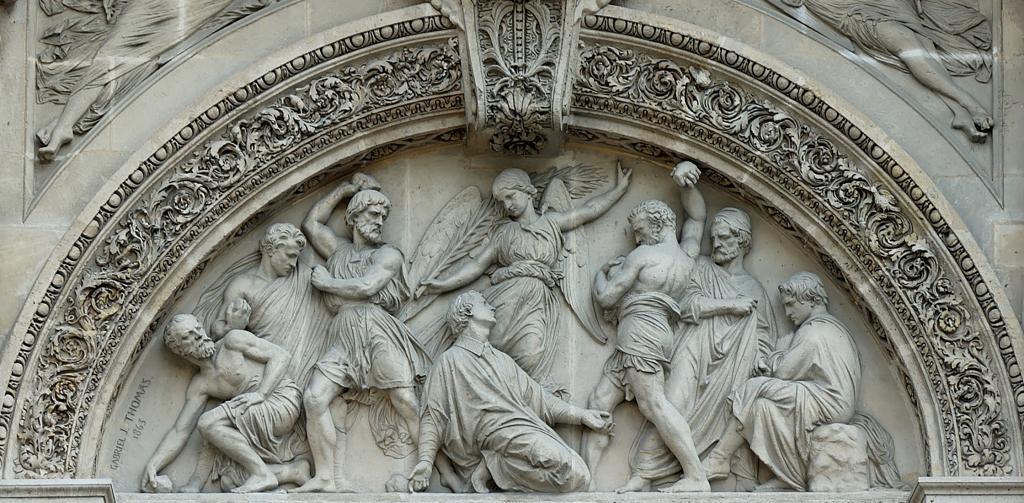
Application: today’s public policy
Given that polls show that U.S. President Donald Trump continues to enjoy majority approval from self-professed “evangelicals,” it is appropriate to ask whether the American church is receiving teaching that adequately challenges his administration’s nationalist narratives of God-ordained ethnic and political dominance.
In recent weeks, the Trump administration has redoubled its commitment to nationalistic policies and attitudes. President Trump famously failed to direct his talent for targeted invective to condemn the odious racism and anti-Semitism of white supremacists marching in Charlottesville, Virginia. Meanwhile, his administration has boosted the “RAISE Act,” a fringe Congressional bill that would filter immigrants to the U.S. for language, education, financial resources and celebrity (Nobelists and Olympic medalists only, please). His much-litigated “travel ban” has sought to bar refugees from Middle Eastern countries, even those already vetted and ready to be received in the U.S.
I was raised conservative. I can easily imagine solving specific social problems on technical grounds with reasonable restrictions on immigration and security provisions grounded in equality before the law. But the foundation of Trump’s policies is a consistent, angry rhetoric of scapegoating and mass accusation. The church should resist such literally “diabolical” language with all its heart. We can model our resistance on Stephen’s speech as we recite the central roles of despised and marginalized people in building our nation.
How quickly we forget that the famous pilgrims were England’s despised rejects. Early pioneers likely learned our now famous love of individual autonomy from Native American culture and exported that love back to Enlightenment Europe, not the reverse (see the last chapter of Charles Mann’s book 1491). Irish Catholic refugees were once a persecuted minority condemned for low morals, taking American jobs, and being prone to treason. Enslaved Africans and their oft-persecuted African-American descendants have rewarded us with multiple waves of the world’s most infectious popular culture, a masterpiece of enduring resilience and defiant celebration.
During his March 2017 visit to Calvin College, Dr. Willie Jennings was asked how the church should respond to racism and nationalism. He had a simple answer: we should focus on our shared identity as Gentiles, as despised “Greeks” who have been graciously grafted into God’s kingdom.
If we trust in Jesus, our origin is in every tribe and nation, and our destination is a celestial city of Jerusalem. That’s the very definition of cosmic city-dwelling: of cosmopolitanism.


